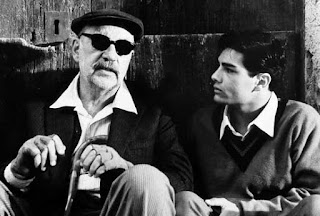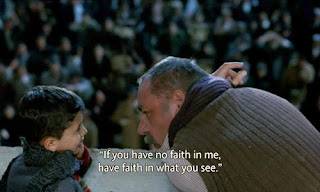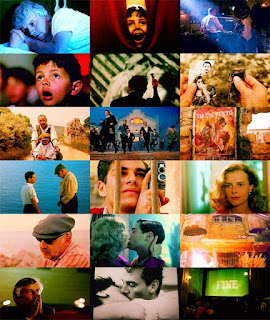` Eat Drink Man Woman (1994) is a movie directed by Ang Lee which was set in Taiwan. The story centers a family; A father who raised his three girls (daughters) by himself after his wife had passed away. Besides already taking the role of parenting (being both a mother and father to his children), he is a renown chef. Outside his home he is respected and sought after by his workers and others although, at home it is a different setting altogether.
One of the main concept that can be seen surrounding this film is the culture and Chinese traditions. It can be seen that his three children lived with him even though they had jobs of their own and are about their late twenty's. In most Asian cultures, the children only leaves the house when they are married. Besides that, children are supposed to take care of their parents, especially the oldest child. Jia-Jen, the oldest assumed she had a responsibility to be 'mother figure' of the family. She threw away her love life because of this.
Jia- Chein the second daughter, wanted to become a chef just like her father but was strongly advised against it by her father. From a cultural point of view, the chefs in these countries are usually males and this was probably one of the reasons why she was prohibited enter the kitchen after her interest in becoming a chef escalated.
Besides that, most Asian family sit together during dinner, it is more of an obligation and sign of respect. Even in the film, it can be seen that their table manners are very much present and that the way they conduct themselves during dinner are very formal.
What is interesting about this film is that all traditions and norms are broken by each of them including the father. The eldest daughter married even before introducing and seeking approval from the father. The second child, plans to get her own place to stay even before getting and married and as for the youngest she gets pregnant even before getting married. Most shockingly is the father, he falls in love with a women who is of the same age as his children.
Gender inequality as well can be seen with the second daughter. As mentioned before, she did not get her father's approval to become a chef. This was also one of the reasons why the second daughter turned out to be successful ( it probably drove her to become independent and aim higher) She is also one of the only female in her company who has a high position.
Lastly but most important is the attachment styles of each daughter.
Mr Chu does not know how to communicate well with his children, yes he has taken care of them but he hardly shows affection in other ways besides his cooking. Cooking for them is the only way he knows how to show love to them. This may have affected their personality.
Jia-Jen being the oldest has an insecure attachment style with her father. Being the oldest, the crown was taken from her when the other two sisters were born thus she coped with this by always trying to be responsible for the family and taking the role of the mother in the family. This attachment style states that anxiousness or ambivalence is shown in her relationships. Jia- Jen fakes a story about a guy who broke her heart in order to stay at home to take care of the father. Besides that, when she was getting love-letters, she was anxious about the coach. Even when they finally did fall in love she wanted to marry him immediately and even convert him to a christian.
As for Jia- Chien, she had an avoidance attachment style. There has been friction between Jia-Chien and her father. Where he hardly comments or speaks to her and when she does comment it is usually a criticism on how the food taste bad an so on. This has an effect with her relationships with men. In the film, she is seen with a guy earlier on but it was purely a 'friends with benefits' situation. She hardly is close with any of her sisters as well and focuses all her time immersing herself in her job.
In conclusion, communication within the family is important, when there is a problem in a relationship or with the way an individual feels it shows in their health and so on. Mr Chu lost his taste buds throughout the movie, but at the end when he was finally content with his life and his children, his regained it. In the end, each family member turned out to happier as they did not bottle up any emotions which brought the family closer together.


































